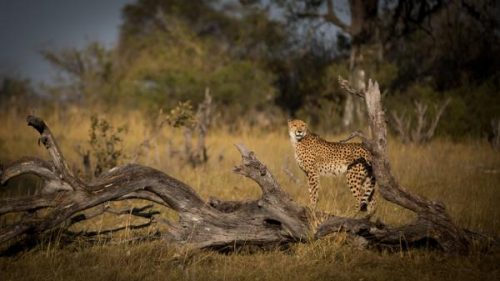Seeing a Cheetah is unforgettable, but soon, memories may be all that’s left of this iconic species warns Deon De Villiers, an African-born safari expert based in Australia.

Mirrabooka, Australia - March 3, 2021 /NewsNetwork/ —
Our generation may be the last to see the world’s fastest cat says Safari Guru.
Cheetahs truly capture the imagination. These are beautiful cats; with their slim, lithe build, beautiful teared faces and stunning coats. But it is their remarkable speed (up to 100km per hour with acceleration to nearly that within three seconds) which leaves those lucky enough to view them in action in awe. Seeing one is unforgettable, but soon, memories may be all that’s left of this iconic species warns Deon De Villiers, an African-born safari expert based in Australia.
When the Safari Guru, Deon De Villiers, is approached by clients seeking a truly personal African experience, he first asks them what they envision doing and seeing on their holiday. “Cheetahs are often among the creatures people want to see in the wild, and as a rare and critically endangered species, sighting one in some of the more remote and pristine wilderness areas has always been a matter of working with a Safari organiser with inside knowledge – plus a bit of luck. But in decades to come, these rare cats face possible extinction – a great loss that only concerted conservation efforts can hope to overcome,” says Deon.
Read: Personalised Guided Kenya Safaris Luxurious Lodges by African Travel Specialists
In 2016, there were just 7,100 Cheetahs left. The plight of cheetahs was highlighted in a 2016 study which called on the IUCN (The International Union for Conservation of Nature),the global authority on the status of the natural world, to change their status from “vulnerable” to “endangered.” That didn’t happen, despite their low estimated global population of 7,500 of which 1,500 were estimated to survive in one southern African country: Botswana. It’s a country that Deon knows well, and he attributes its “large” cheetah population not only to the massive wilderness areas this country has to offer, but also to the low numbers of human population in the outlying areas constituting mostly of Kalahari type ecosystems.
Kenya is another stronghold of the cheetah. Despite habitat encroachment in many areas, sightings of this stunning cat have increased in the Masai Mara and Lewa areas of the country. A member of the Safari Guru team was fortunate enough to have several amazing sightings on their recent Kenya trip in December; while evaluating COVID safety measures across some of their preferred partner properties – a crucial element of keeping close to our respected suppliers in today’s travel safe climate.
‘Despite the sprinklings of good news, “these animals are heading towards extinction in many African habitats,” he says “it’s concerning that many of the threats facing the species are simply getting worse over time.” Putting the brakes on habitat loss may be Botswana’s biggest achievement in Cheetah conservation. “The wilderness areas there are truly remarkable,” says Deon, “and there are many African travel dreams that are fulfilled by safariing in the country.” Kenya too has seen huge strides in its conservation efforts by working to impassion and enrich local communities.
Read: Private Guided Primate Safaris Gorillas of Rwanda by African Travel Specialists
Taking a “Last Chance to See” break helps those working to save wildlife. Apart from trying to live greener lives, Deon urges those who are concerned about the future of conservation in Africa to visit the African wilds. Not only fulfilling any travel dream but also to boost much-needed conservation efforts. “Conservation costs money, and in Africa, that can create conflicts between human needs and conservation needs,” he explains. “Ecotourism isn’t just about making dreams come true. Even those who don’t realise it are making a valuable contribution, either directly or indirectly, to everything from animal breeding programs to the continued existence of the protected areas that African wildlife needs to survive. If enough people decide to take the last chance to see endangered animals in their natural habitat, it’s possible that conservationists will have enough funds, not only to continue their work, but also to succeed.”
It’s the ultimate win-win. With personalised African holiday experiences at their fingertips, Deon’s clients experience Africa in luxurious splendour – and though it may seem self-indulgent, they can rest assured that their interest (and much of their tourism dollars) will help the people on the ground who are working so hard to conserve Africa’s wilderness and the animals that live in it.
For more information visit the African Travel Specialist | Safari Guru website or call Deon De Villiers and his team of experts on (+61) 0427 782 226.
Syndicated by Baxton Media, The Market Influencers, Your Digital Marketing Agency.
Contact Info:
Name: Public Relations
Email: Send Email
Organization: Safari Guru
Address: Fishery Point Road, Mirrabooka, New South Wales 2264, Australia
Phone: +61-427-782-226
Website: https://safari-guru.com/
Source: NewsNetwork
Release ID: 88999273
